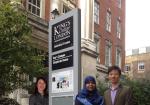



Theme
2JJ Communication
INSTITUTION
King's College London, School of Medicine
Experiential interactional workshop using simulated patients (SPs) is the most effective way of teaching doctor-patient communication. Students learn by reflecting on the interactional process and receiving feedback from SPs, peers and teachers. This process requires meta-analytic skills to unpack the complexity of human communication, which, however, is not part of the training either for teachers or students. Reflection and feedback varies with people’s various professional, disciplinary and personal experiences. Unpacking the complexity of clinical communication and elaborating on what counts as good practice remains a challenging task.
This project aims to develop an innovative technology-enhanced learning opportunity for teaching and learning a new analytical tool, which allows systematic and holistic analysis of verbal interaction.
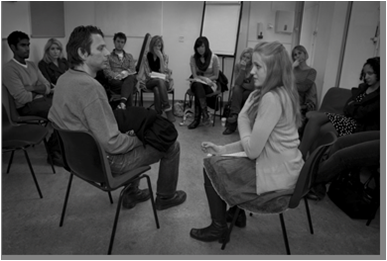
Sociolinguistics may inform the teaching of clinical communication in the current era, where communication has to be individualised, take account of increasing diversity and accommodate the personal concerns and preferences that patients are entitled to bringing to modern medical consultations.
Both the content and methods for teaching and learning will benefit from such an innovative development in order to meet the requirements of evolving clinical communication.
We thank King's College London for funding this project; the core team members without whom this project would not be possible, and also the students and tutors who will participate in the evaluation.
Phase 1: Tool development & E-learning development
- We formed an interdisciplinary team including, sociolinguists, communication tutors, a GP, a language teacher, UK and international medical students
- Reviewed analytical frameworks of Conversation Analysis and Discourse Analysis, used in qualitative research of institutional conversations
- Translated them into an analytical tool for clinical communication education
- Developed interactive e-learning
Phase 2: Evaluation
- Participants: 30 medical students from years 2-4 of MBBS programme; 10 communication tutors
- Pre- and post-intervention assessment of participants’ analytical skills
- Interventions: face-to-face teaching + self-directed e-learning
- Evaluations of
- face-to-face teaching,
- e-learning
- the overall impact on participants’ future learning or teaching


Final products include:
- A new analytical tool;
- A Handbook;
- A web-based e-learning (see attached video).
The e-learning can also be accessed through here (active between 18 Aug and 30 Sept 2014): http://ehealth.kcl.ac.uk/tel/analysing-clinical-talk/01-introduction.html
We are still in the process of evaluating the project, the result of which will be published in a journal article.
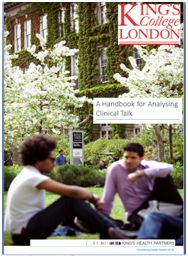
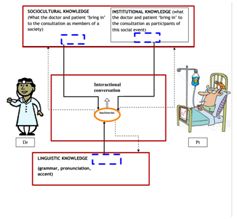
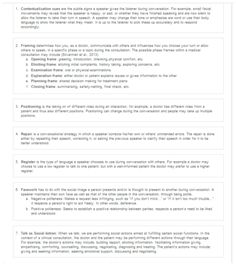
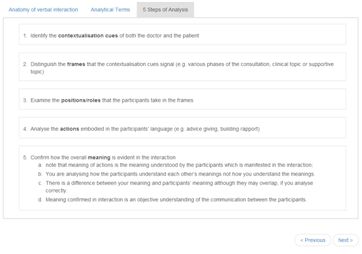
Li, S., Said, F., Heavey, E., O’Neill, B., et al (2014). Analysing Clinical Talk—an interdisciplinary approach to teaching and learning clinical communication, Lightning talk in 8th KCL Excellence in Teaching Conference, 16th June 2014, London, King’s College London.
SILVERMAN, D. 2010. Doing qualitative research: a practical handbook, Los Angeles ; London, SAGE.
 Send Email
Send Email